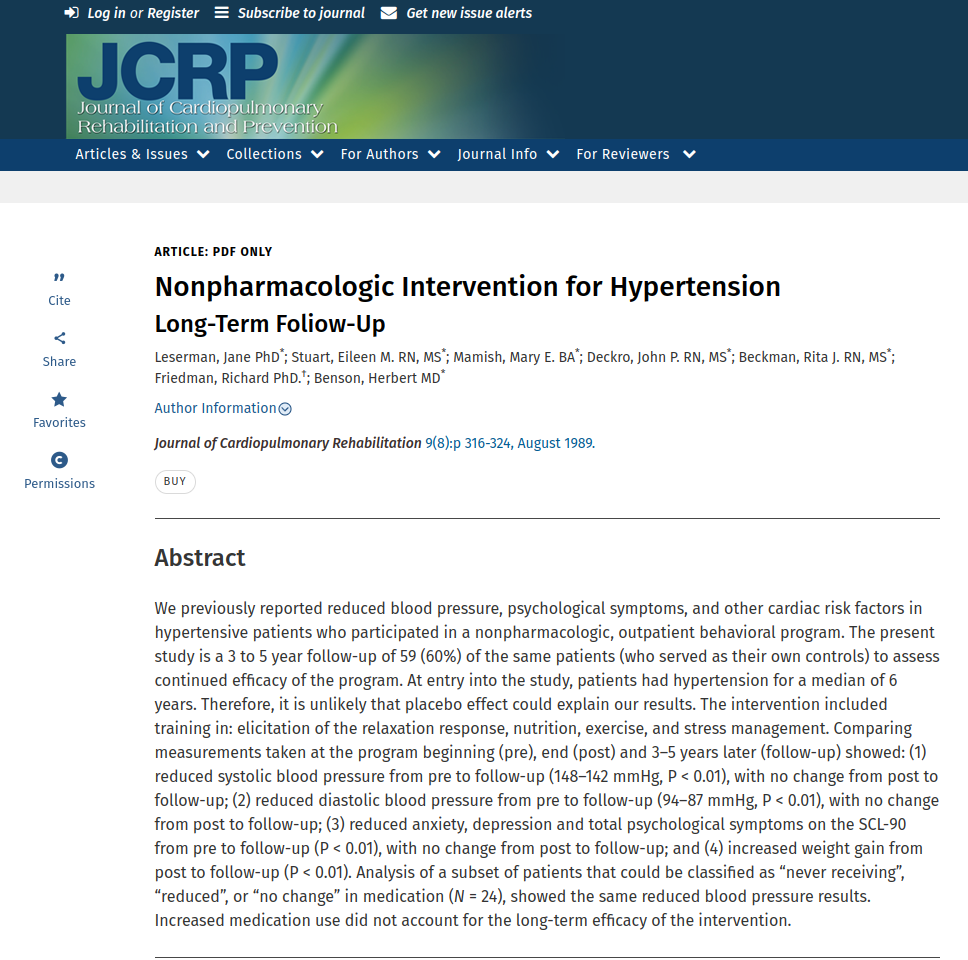We previously reported reduced blood pressure, psychological symptoms, and other cardiac risk factors in hypertensive patients who participated in a nonpharmacologic, outpatient behavioral program. The present study is a 3 to 5 year follow-up of 59 (60%) of the same patients (who served as their own controls) to assess continued efficacy of the program. At entry into the study, patients had hypertension for a median of 6 years. Therefore, it is unlikely that placebo effect could explain our results. The intervention included training in: elicitation of the relaxation response, nutrition, exercise, and stress management. Comparing measurements taken at the program beginning (pre), end (post) and 3–5 years later (follow-up) showed: (1) reduced systolic blood pressure from pre to follow-up (148–142 mmHg, P < 0.01), with no change from post to follow-up; (2) reduced diastolic blood pressure from pre to follow-up (94–87 mmHg, P < 0.01), with no change from post to follow-up; (3) reduced anxiety, depression and total psychological symptoms on the SCL-90 from pre to follow-up (P < 0.01), with no change from post to follow-up; and (4) increased weight gain from post to follow-up (P < 0.01). Analysis of a subset of patients that could be classified as “never receiving”, “reduced”, or “no change” in medication (N = 24), showed the same reduced blood pressure results. Increased medication use did not account for the long-term efficacy of the intervention.
Nonpharmacologic Intervention for Hypertension Long-Term Foliow-Up
Publication
Journal of Cardiopulmonary Rehabilitation
9(8):p 316-324
Abstract
Web and Email Links
Related Listings
Journal
Behavioral Medicine
To clarify the mechanisms of gender-related mind/body relationships, the authors analyzed the characteristics of 1,132 outpatients (848 women and 284 men) attending a mind/body medicine clinic. At entry in the program, the patients completed the Medical Symptom Checklist, Symptom Checklist-90 revised (SCL-90R), and Stress Perception Scale. Women reported 9 out of 12 symptoms (fatigue, insomnia, headache, back pain, joint or limb pain, palpitations, constipation, nausea, and dizziness) […]
Journal
Journal of Chronic Diseases
A prospective investigation was designed to test whether the altered behavior of the regular practice of a relaxation, meditational technique might lower blood pressure in 22 borderline hypertensive subjects. The investigation was unbiased with regard to the presence of antihypertensive agents; subject familiarity with blood pressure measurement or with the observer; observer error; and the effects of blood pressure variability. During the control period, blood pressures averaged 146. […]
Journal
Neuroreport
Meditation is a conscious mental process that induces a set of integrated physiologic changes termed the relaxation response. Functional magnetic resonance imaging (fMRI) was used to identify and characterize the brain regions that are active during a simple form of meditation. Significant (p<10(-7)) signal increases were observed in the group-averaged data in the dorsolateral prefrontal and parietal cortices, hippocampus/parahippocampus, temporal lobe, pregenual anterior cingulate […]

